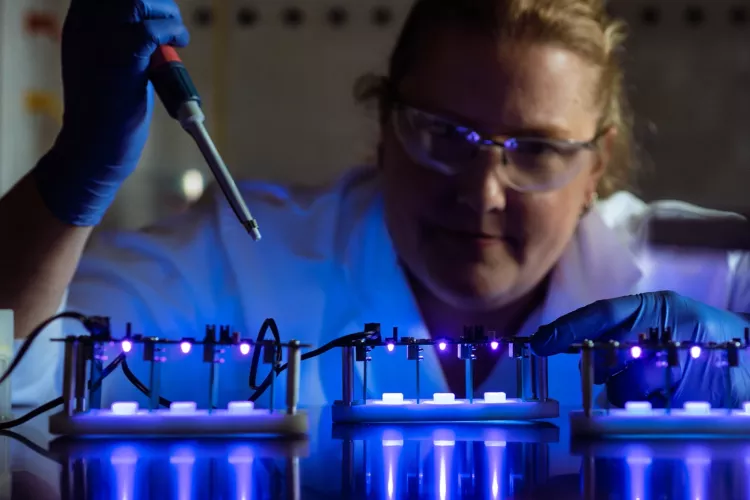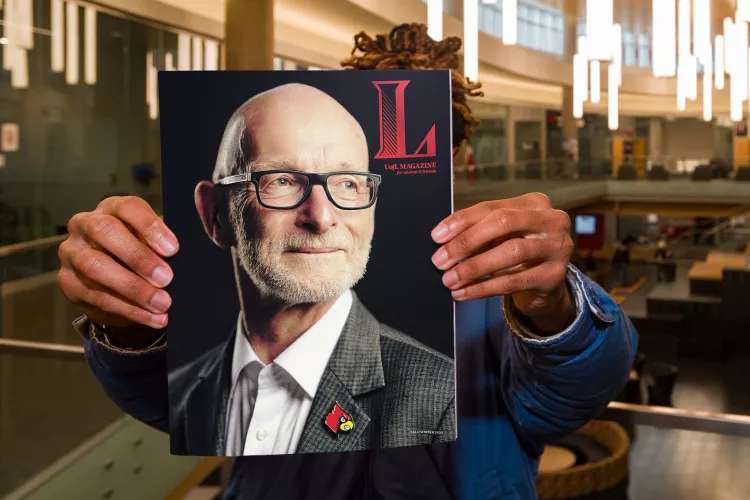UofL's Post COVID-19 Research Clinic documents long-term effects of infection
October 2, 2024When Sophie Fritschner came down with COVID-19 on New Year’s Eve, she had a low-grade fever, cough and body aches. It took her a few weeks to get over the cough and congestion, but the 69-year-old resident of Louisville’s Highlands neighborhood has had no symptoms since.
For Catherine Gamas, it was a different story. Her symptoms were more severe and have lingered. She lost her senses of taste and smell and experienced extreme fatigue and confusion. Months after her diagnosis, the 56-year-old Clarksville, Indiana, resident still has intermittent loss of taste and smell, dizziness, daily headaches and hair loss and said she bruises easily.
“I would do one thing and have to sit down. I could go down the stairs but not back up,” she said. “The hair loss is most distressing. It used to take two hours for my hair to dry normally. Now it’s 15 minutes at best.”
Dale Josey, a Louisville resident and podcaster, also reported symptoms that disrupted daily routines. He developed lethargy and weakness, had painful joints and was extremely cold. He also experienced blinding headaches, nausea and loss of taste.
“It was too intense to eat,” he said.
To help researchers better understand these and other short- and long-term effects of COVID-19, Fritschner, Gamas and Josey are participants with the Post COVID-19 Research Clinic at the University of Louisville. They are committed to furthering knowledge of post-COVID-19 conditions by sharing their experiences to help UofL researchers learn more about how the disease affects people differently and hopefully improve treatment for others during and after the illness.
For Josey, participation in the research clinic is essential “to add to the body of scientific research.” For the same reason he regularly donates blood (7 gallons of lifetime donations), Josey is participating to improve the health of the Louisville community.
The UofL Division of Infectious Diseases created the multidisciplinary research clinic to study the wide variety of symptoms and effects of COVID-19. Volunteer participants from Louisville and surrounding areas who previously were diagnosed with COVID-19 can participate in the research study to document and monitor their symptoms and health changes over time.
“We will conduct comprehensive mental and physical assessments to determine the many possible effects of COVID-19,” said T’shura Ali, a UofL postdoctoral associate who manages the research clinic. “We want to expand the knowledge of how the disease progresses, to help improve treatments and interventions – both when patients are initially sick and after – to define, measure and prevent the long-term effects of COVID-19.”
Post-COVID symptoms can be any change in quality of life, health status or symptoms that emerge after the infection. COVID-19 patients have reported a wide variety of symptoms weeks and months following their initial infections, but some of the most common include:
- Decreased cardiac function (fast-beating or pounding heart, heart palpitations, chest pains)
- Decreased lung capacity (difficulty breathing or shortness of breath)
- Joint or muscle pain
- Blood clotting issues
- Decline in mental health
- Intense migraines or headaches
- Fatigue
- Brain fog (difficulty thinking or concentrating)
- Continued loss of smell or taste
Participants for the study from Louisville and surrounding areas age 18 and over who have had COVID-19, confirmed by a diagnostic test, are eligible to participate in the study whether they have experienced long-term symptoms following infection or had no additional symptoms. Vaccination status does not affect eligibility.
Researchers will record study participants’ health history and all their COVID-19 symptoms and health changes over time. They will record vital signs, conduct physical examinations and administer validated health assessments, vision tests, lung function tests and electrocardiograms (EKG). Study participants also will be asked to provide blood and urine samples at each visit. The data will be analyzed by a group of experts led by Julio Ramirez, professor and chief of the Division of Infectious Diseases, including physicians and researchers in cardiovascular medicine, perioperative medicine, pulmonary care and critical care, as well as clinical and translational researchers.
To further study decreased heart and lung function, some of the most common and severe symptoms associated with COVID-19, Jiapeng Huang, professor in the Department of Anesthesiology and Perioperative Medicine, is conducting a sub-study of the research clinic’s participants, supported by Gilead Sciences.
“For this project, we will study the heart, lungs and blood vessels of individuals who have been ill with COVID-19 using ultrasounds done at the clinic. This research will establish the foundation for future preventive and therapeutic strategies,” Huang said.
“These participants are helping to contribute to clinical care, research and science in understanding the burden of disease to help guide progress toward better treatment and care, which ultimately will improve the Louisville community’s overall health,” Ali said.
All appointments and tests are free for the participants. Information will be used for research purposes only and will remain confidential. The research clinic does not provide treatment or referrals, but abnormal findings will be reported to the participants. Study visits are conducted every three to six months and participants are followed for approximately one year.
To learn more, visit the division website, email COVClinic@louisville.edu or call 502-852-8680.
Betty Coffman is a communications coordinator focused on research and innovation at UofL. A UofL alumna and Louisville native, she served as a writer and editor for local and national publications and as an account services coordinator and copywriter for marketing and design firms prior to joining UofL’s Office of Communications and Marketing.



